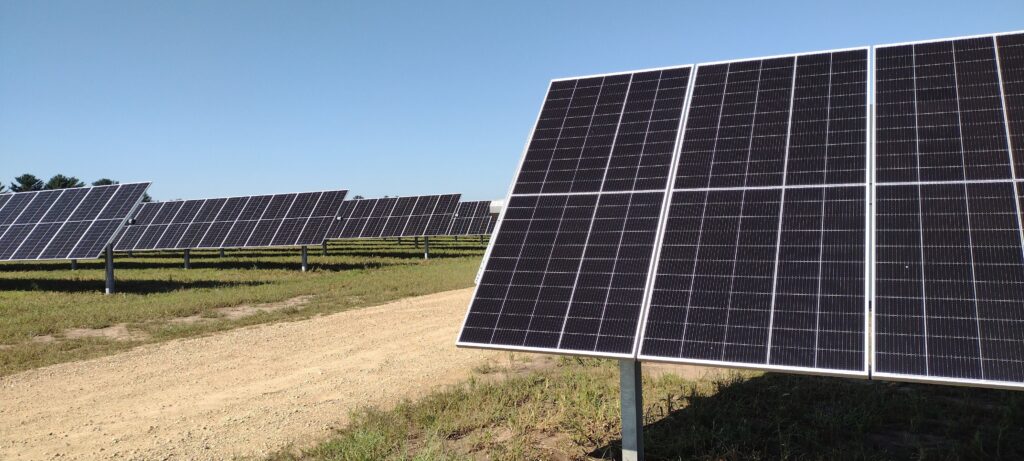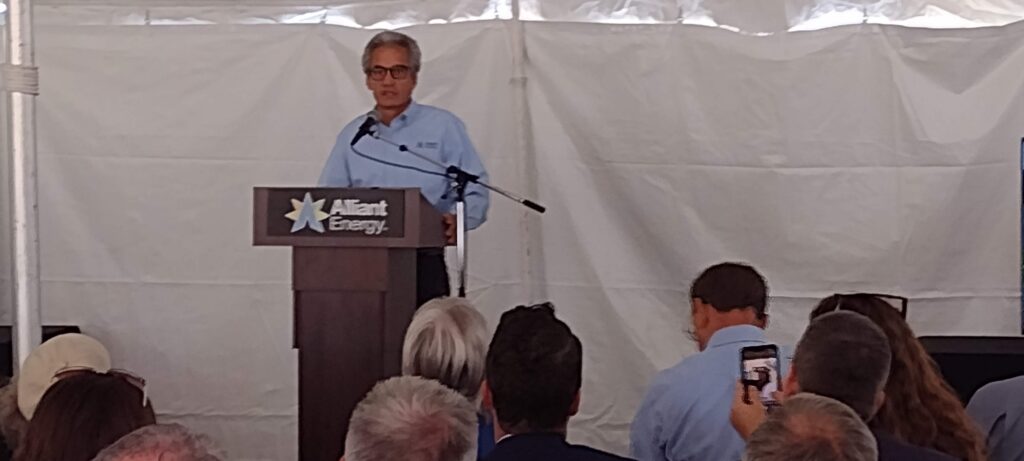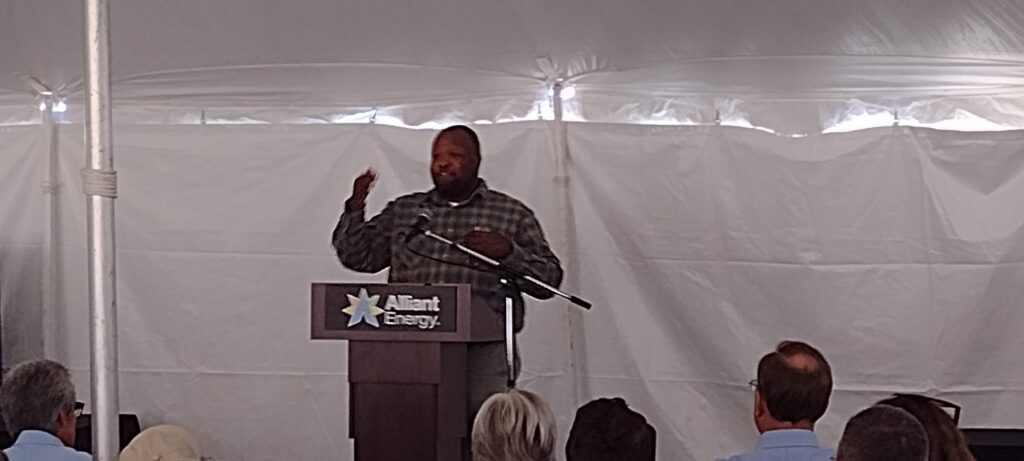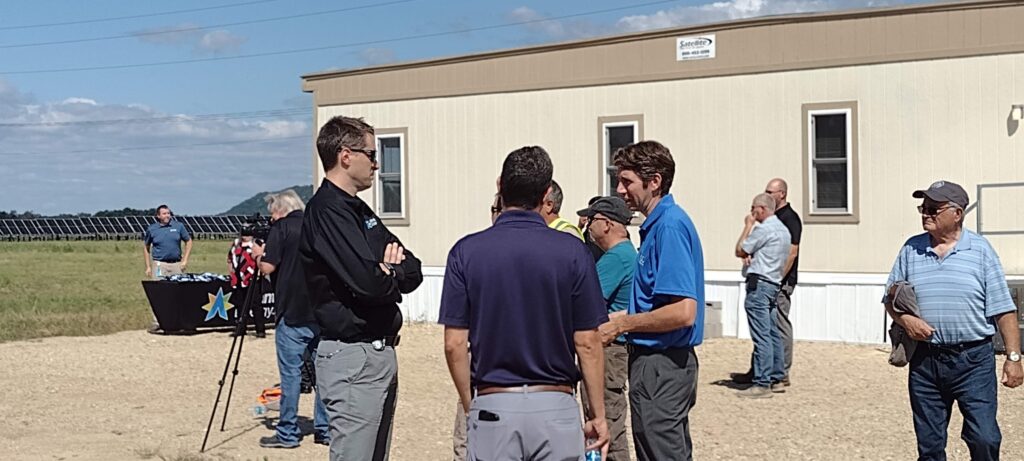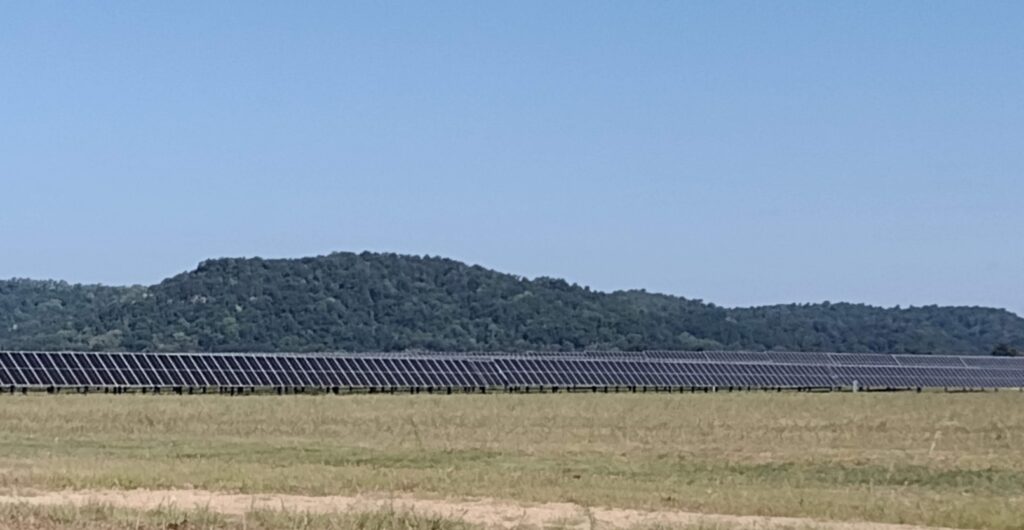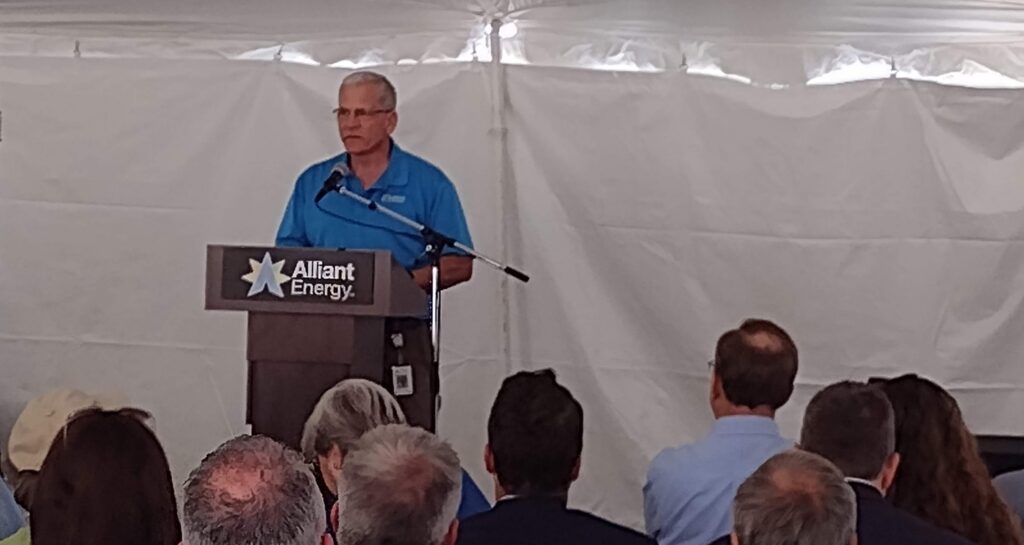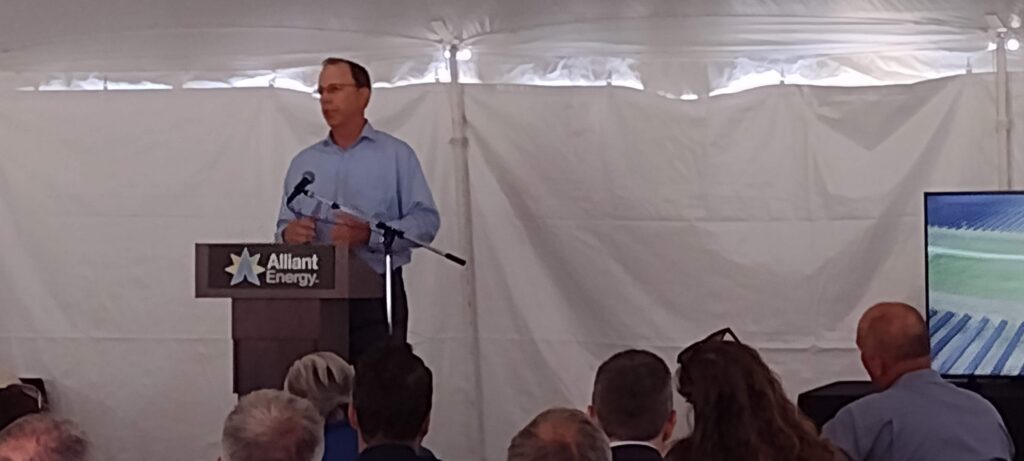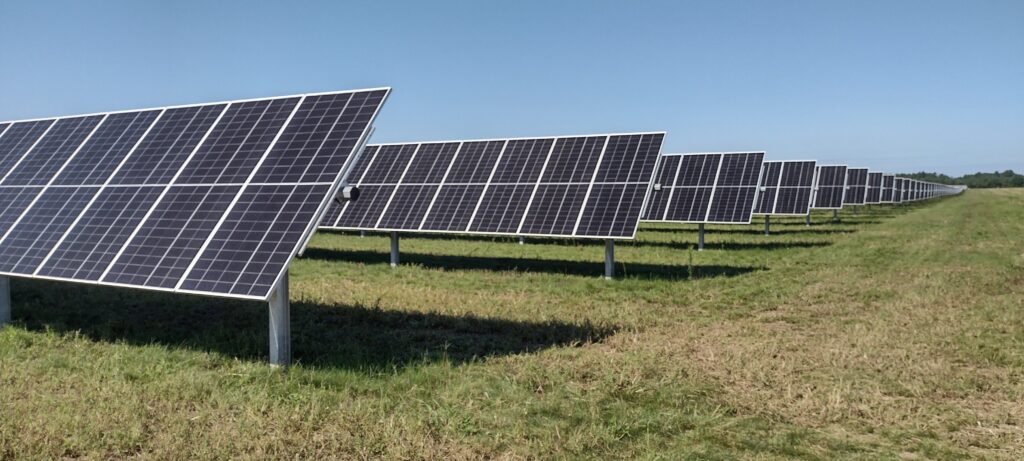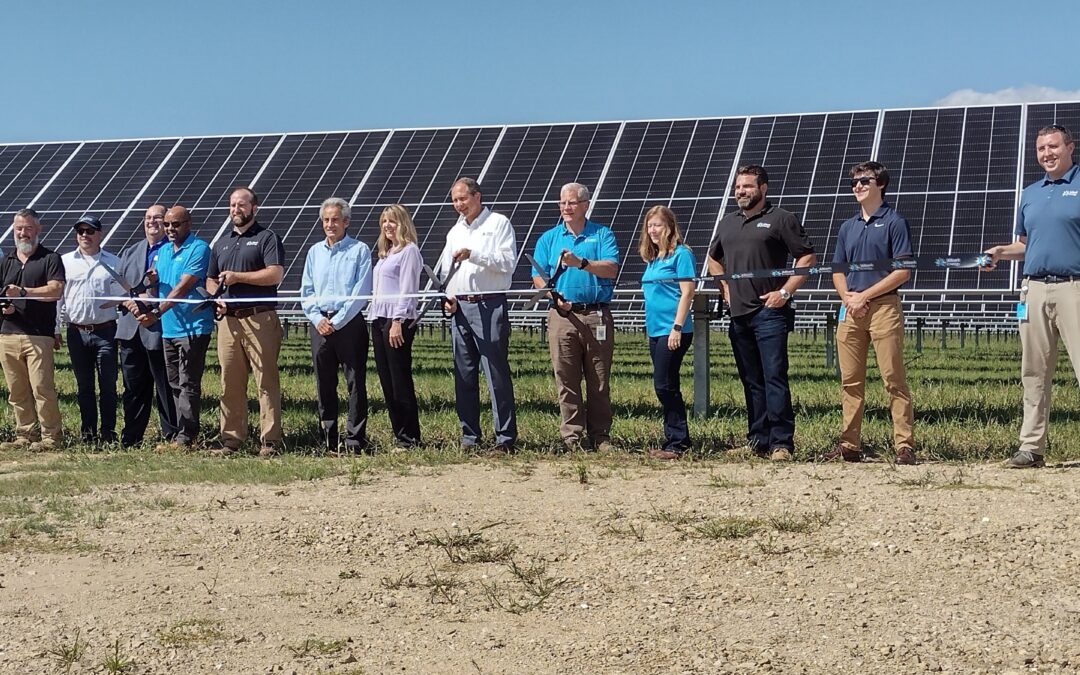
by Michael Vickerman | Aug 29, 2022 | Community, Events, Local Initiatives, Solar, Sustainability
Bear Creek Project Ushers in Gigawatt of Solar Capacity
Alliant Energy’s ambitious solar portfolio debuted on August 22 with a ribbon-cutting ceremony at its 50-megawatt (MW) Bear Creek project near Lone Rock in Richland County. Electricity produced from Bear Creek should equate to the annual consumption of approximately 13,000 residences.
Bear Creek will be followed by 11 more Alliant-owned solar projects totaling more than a gigawatt (1,000 MW), which are expected to go online over the next 18 months. Indeed, Alliant’s Wisconsin affiliate is on a trajectory to source 20% of its electricity from solar power by 2025. All 12 projects were approved by the Public Service Commission (PSC). (See table below for a complete list of Alliant’s solar projects.)
“This project is an incredible milestone for our customers,” said David de Leon, Alliant Energy’s Wisconsin President. “Guided by our purpose-driven strategy to serve customers and build stronger communities, this solar farm diversifies our energy portfolio, boosts American energy independence, and increases access to affordable electricity.”
The Bear Creek project drew praise from several project partners, including the Town of Buena Vista. “This project represents a significant, long-term investment in our community,” said Van Nelson, the town of Buena Vista clerk. “The township appreciated how well they were kept informed of progress throughout the project.”
With the completion of Bear Creek, Buena Vista and Richland County expect to reap a combined $200,000 annually from the state’s shared revenue program over 30 years. The project site covers 456 acres.
Construction of the Bear Creek solar farm began in July 2021. Burns & McDonnell was the lead contractor for the project and engaged operating engineers, carpenters, laborers, and electricians from several local union halls – increasing the positive economic impact and community benefit.
“When businesses partner with the skilled forces of Wisconsin’s unionized building trades, they know they’re going to get a safe, quality product that delivers superior value for everyone,” said Emily Pritzkow, Executive Director of the Wisconsin Building Trades Council. “By prioritizing using local unionized labor on renewable energy projects, Alliant Energy is supporting a strong workforce, keeping project dollars in the community and boosting our state economy.”
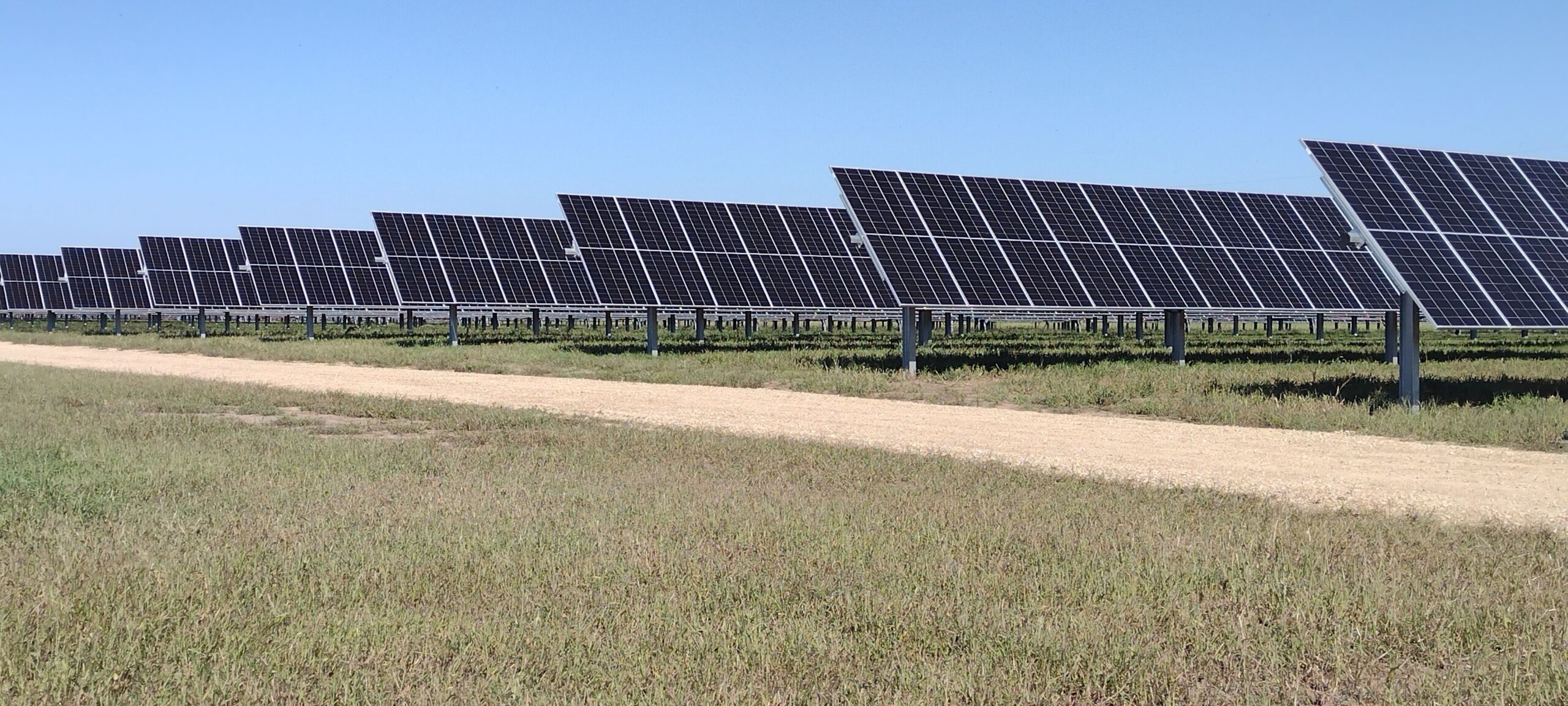
At the ribbon-cutting, Alliant officials drew attention to the safety record achieved during construction. According to Cameron Garner, construction project manager at Burns & McDonnell, not a single accident resulting in a loss of labor hours was recorded during the project’s construction. This is a remarkable achievement considering that 120,000 hours of labor were logged in completing the solar farm.
Alliant has scheduled its next ribbon-cutting ceremony in late September at its 150 MW Wood County solar farm near Nekoosa. A third ceremony will likely follow in November at the utility’s North Rock project north of Janesville.
Over the last three years, the PSC has approved 1,850 MW of utility-owned solar generating capacity in Wisconsin. Of that total, nearly 60% of that capacity will serve Alliant Energy’s Wisconsin customers. PSC Commissioner Tyler Huebner joined Alliant officials and other project partners in the ribbon-cutting.
|
Approved Alliant Energy solar projects
Docket Nos. 6680-CE-182 and 6680-CE-183
|
| Project name |
Location (county) |
Capacity (in MW) |
Start date |
| Albany |
Green |
50 |
2023 |
| Bear Creek |
Richland |
50 |
8/2022 |
| Beaver Dam |
Dodge |
50 |
2023 |
| Cassville |
Grant |
50 |
2023 |
| Crawfish River |
Jefferson |
75 |
12/2022 |
| Grant County |
Grant |
200 |
2024 |
| North Rock |
Rock |
50 |
11/2022 |
| Onion River |
Sheboygan |
150 |
2023 |
| Paddock |
Rock |
65 |
2023 |
| Springfield |
Dodge |
100 |
2023 |
| Wautoma |
Waushara |
99 |
2023 |
| Wood County |
Wood |
150 |
9/2022 |
| Total |
1,089 |
|
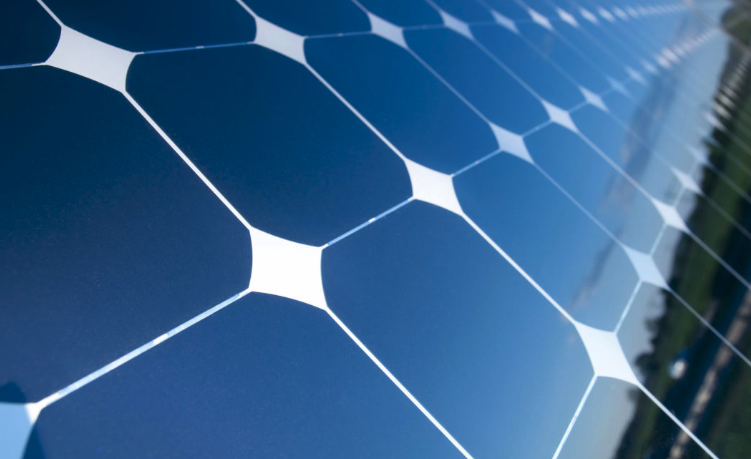
by Jodi Jean Amble | Jul 25, 2022 | Local Initiatives, Press Release, Public Service Commission, Solar
On Thursday, the Wisconsin Public Service Commission (PSC) agreed to open a docket to determine whether individual residents and businesses may access renewable energy produced on their premises using equipment owned by third parties.
“RENEW Wisconsin commends the PSC decision,” said RENEW Wisconsin Policy Director Michael Vickerman. “While this arrangement, often described as third party-financing, is expressly legal in 29 states, it has remained a legal gray area in Wisconsin for far too long.”
“In accepting the petitions filed by Vote Solar and the Midwest Renewable Energy Association, the PSC has now committed to resolving this ambiguity,” Vickerman continued. “PSC affirmation of third party financing is essential to spreading the benefits of clean energy to all Wisconsin utility customers.”
Vickerman noted that this lingering uncertainty has greatly impeded renewable energy uptake among individuals and organizations that cannot afford large upfront outlays or do not qualify for federal tax credits. These particular customers include nonprofits, small businesses, houses of worship, schools and local governments, and low-to-moderate income residents.
Vickerman continued: “A favorable ruling from the PSC would allow Wisconsin’s solar marketplace to catch up with neighboring states such as Iowa and Illinois. In those states, there is no barrier to customers hosting renewable energy systems owned by third parties and paying for this service through a lease or a power sale agreement.”
“We believe third-party financing is a critically important tool for empowering customers to scale back their fossil fuel usage,” Vickerman said. “Without expressly affirming the legality of ordinary financing mechanisms such as leases, we do not see how the state of Wisconsin will come anywhere near close to achieving a net zero carbon goal by 2050.”
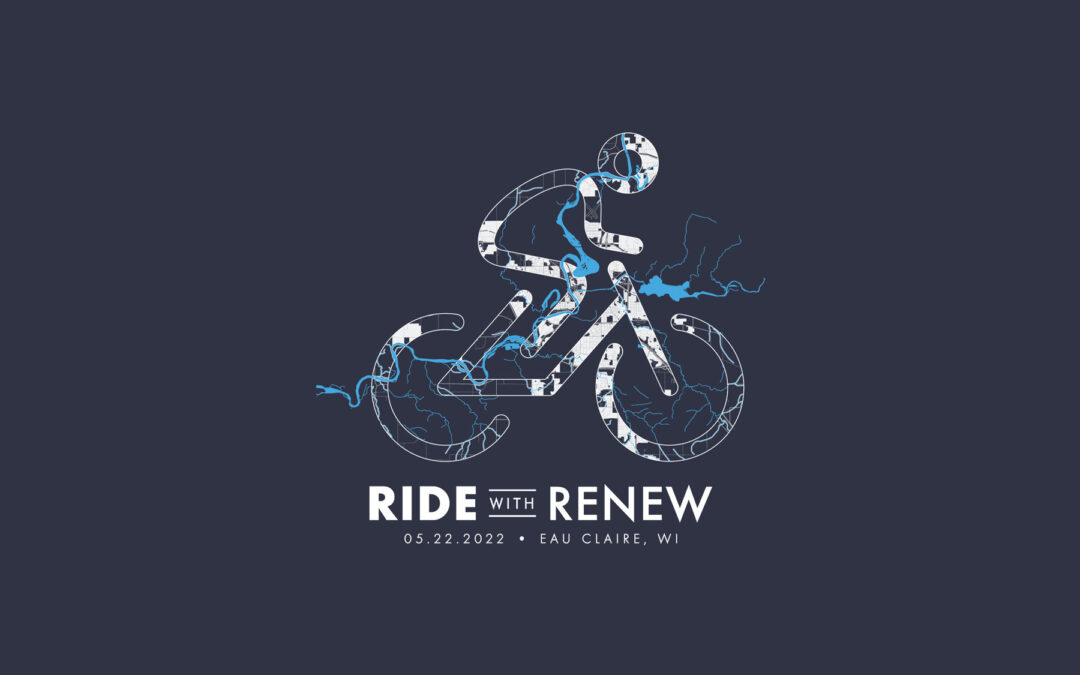
by Jodi Jean Amble | May 25, 2022 | Community Solar, Events, Geothermal, Local Initiatives, RENEW Wisconsin, Solar
On Sunday, May 22, RENEW Wisconsin, with presenting sponsor, Xcel Energy, hosted the 9th Annual “Ride with RENEW” bike ride fundraiser in Eau Claire, WI. Starting at Carson Park, the 16-mile route featured the Chippewa River State Trail and Lakeshore Trail. Over 20 riders enjoyed a chilly spring day pedaling and learning about the innovative renewable energy installations powering Eau Claire, Wisconsin.
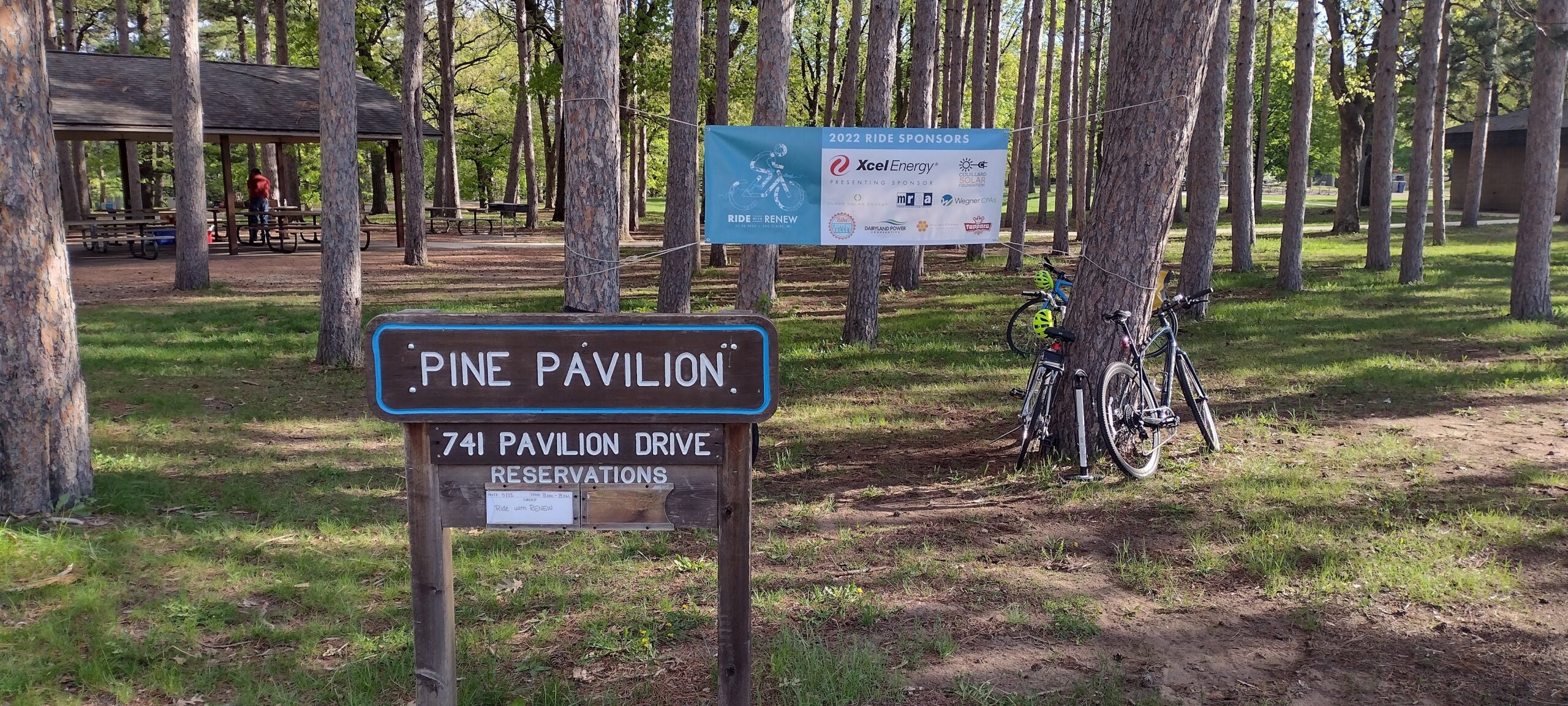
The first stop of the 2022 tour was Solar Forma. Brian Graff showed riders the company’s unique solar designs, including E-cacia trees, their signature product. Solar Forma wants to expand its solar designs to include a solar “wave” carport with electric vehicle charging.
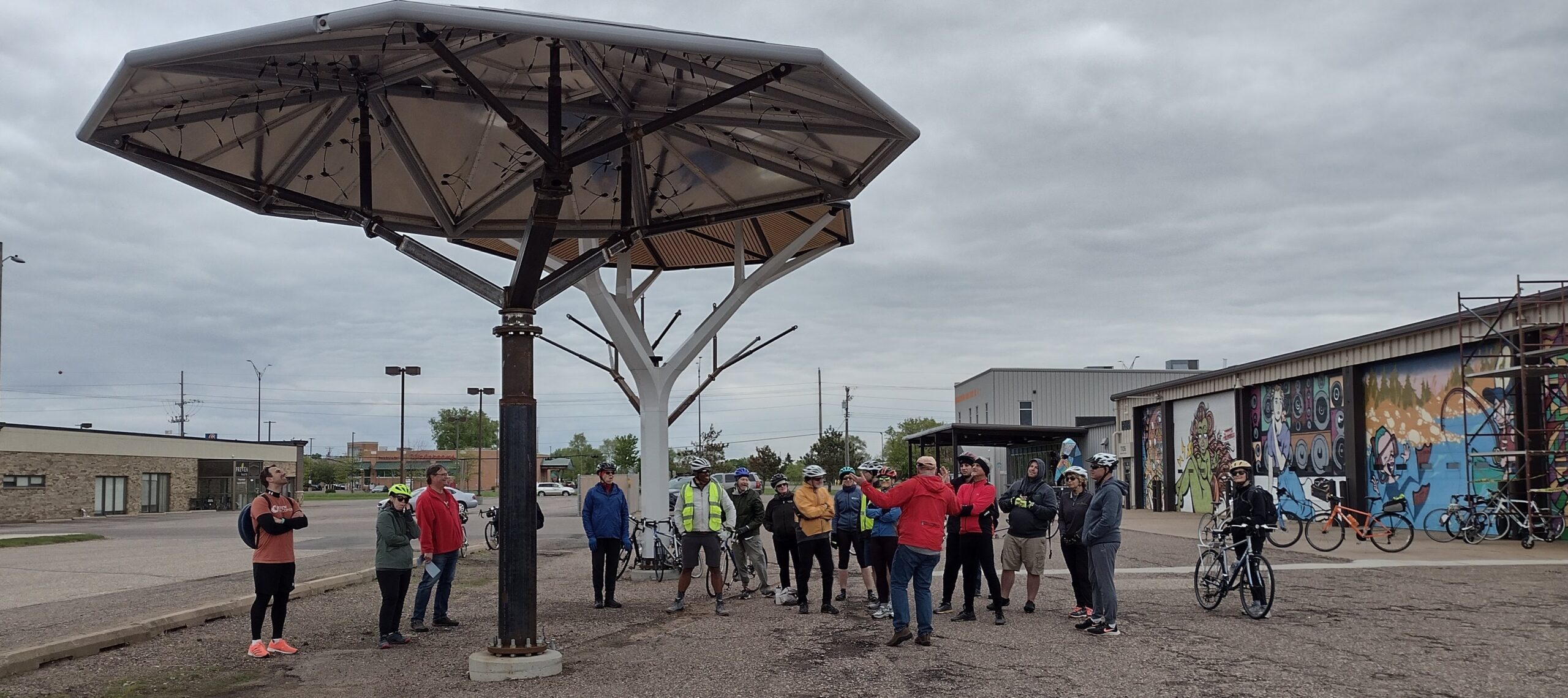
Next, riders visited Xcel Energy’s Sky Park Solar Garden. Julie Thoney and Zeus Stark provided an up-close look at the 1MW community solar garden at Sky Park, and riders also learned about Xcel’s three other Wisconsin community solar gardens. Xcel was the first investor-owned utility in the country to propose a net-zero carbon goal. They’re looking to expand their renewable portfolio in all operating states, including Wisconsin.
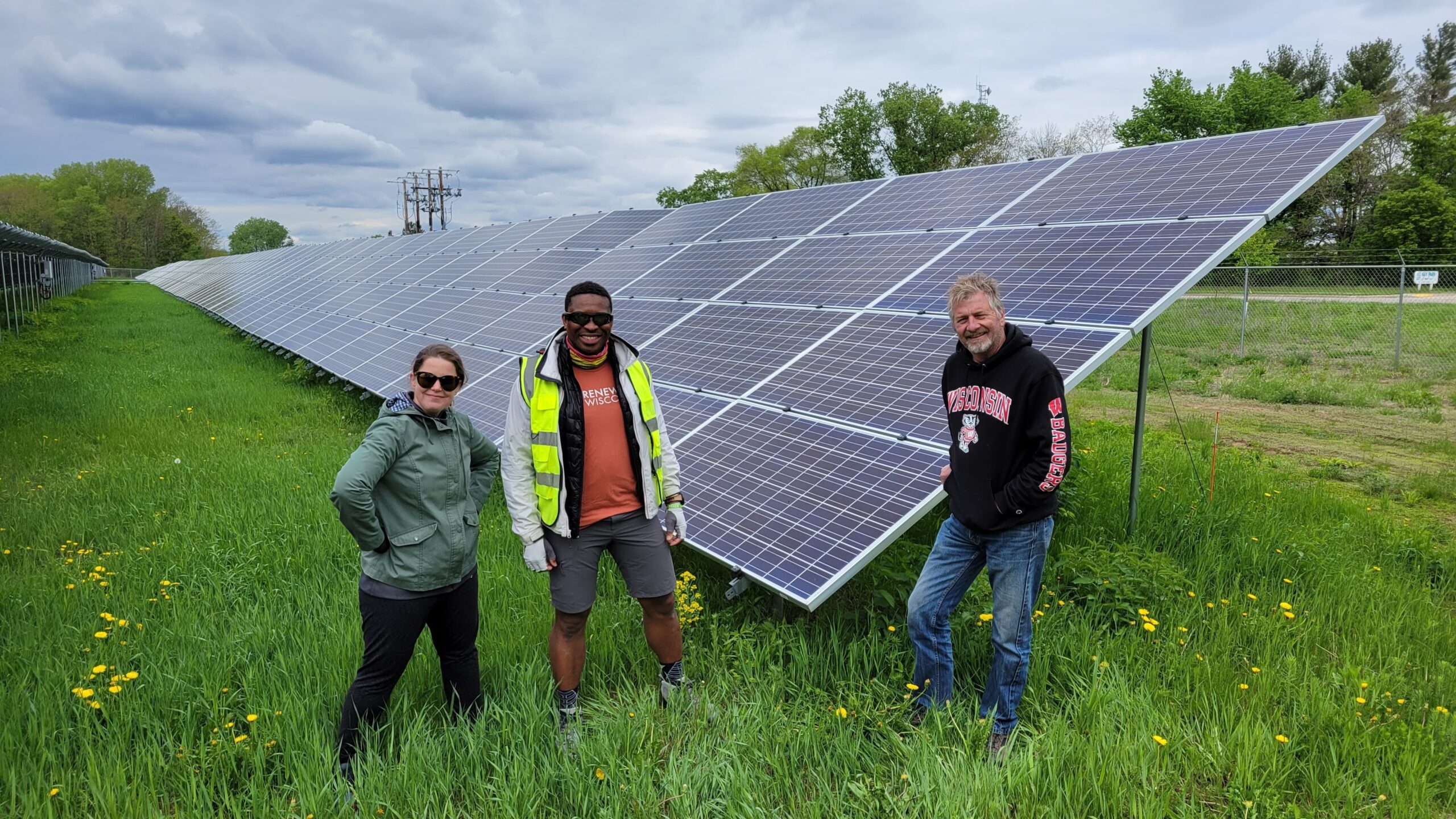
The next stop on the ride was Chippewa Valley Technical College (CVTC) Energy Education Center. Adam Wehling and Zeus Stark showed riders a variety of renewable energy generation sources on display, including several solar layouts and multiple small wind turbines, which is the same equipment CVTC uses in their class lessons. Riders also heard from Claire Lindstrom from the Couillard Solar Foundation about their work to make solar more accessible to public schools and mission-based organizations throughout the state. The Couillard Solar Foundation supplied 80 kilowatts of solar panels to CVTC, which provides approximately 40% of the electricity consumed at the Energy Education Center.
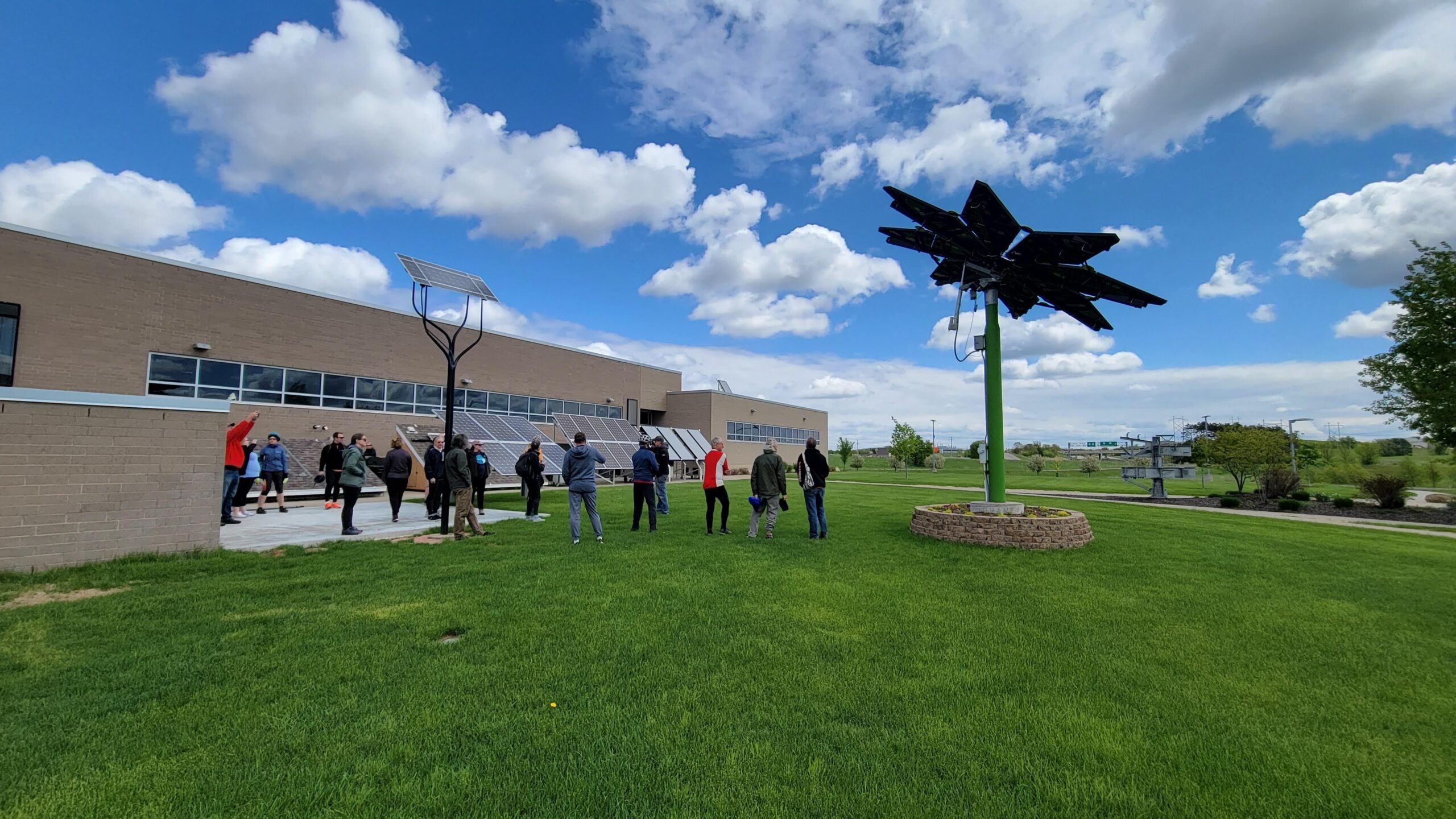
The final stop of the 2022 Ride was the home of long-time friend and former board member of RENEW, Ellen Terwilliger. Over the last decade, Ellen and her husband Steve installed four geothermal wells for heating and 15 kilowatts of solar PV, offsetting around 80% of their energy needs. The property also contains electric-vehicle charging, native prairie grasses, and several rain barrels. The Terwilligers even removed and reinstalled a south-facing rooftop to optimize their solar panels!
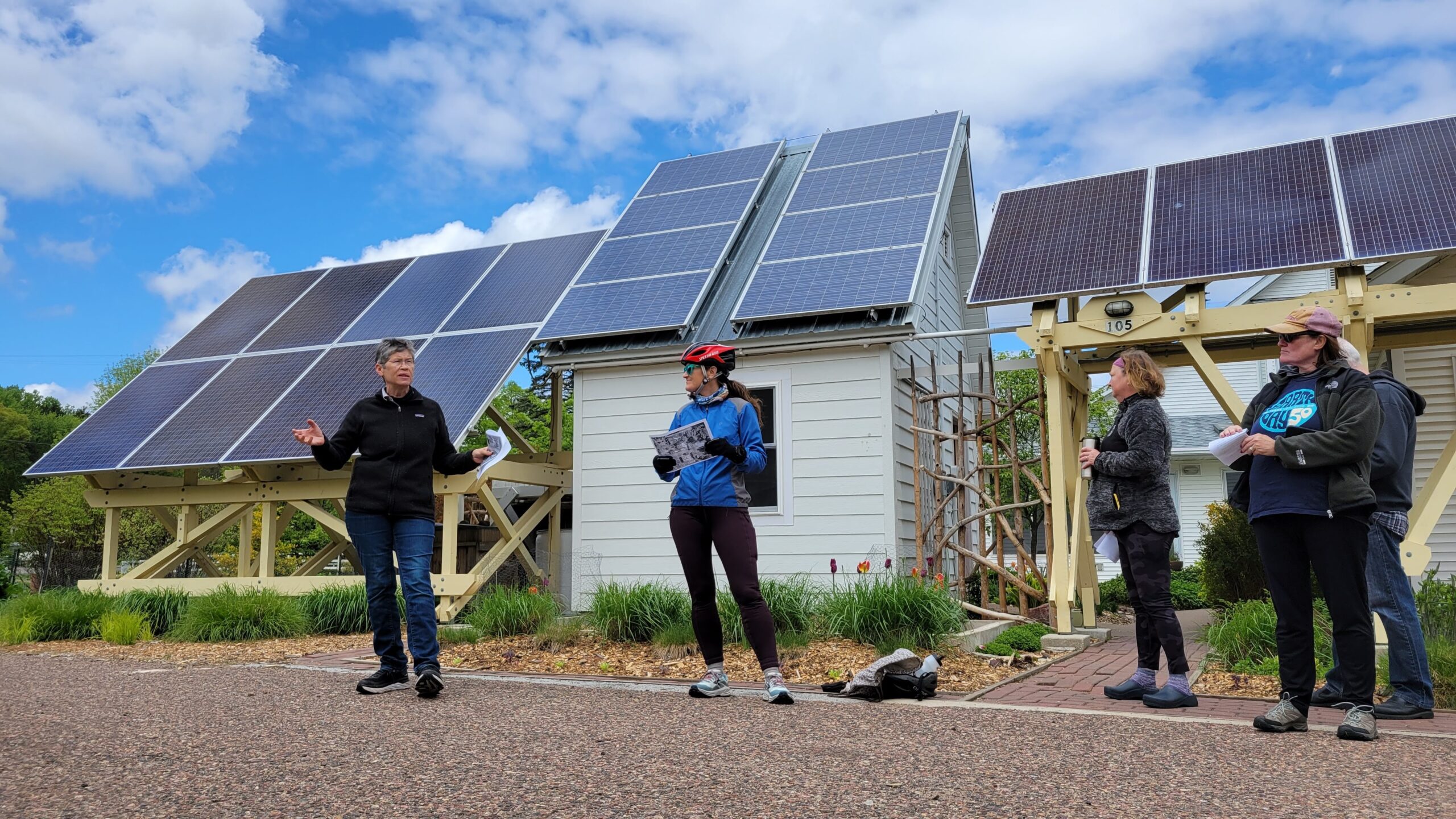
Our 2022 Ride with RENEW ended back at Carson Park with Toppers pizza and a brief address from Jim McDougall discussing his work to install solar on Eau Claire schools. Thanks to Eau Claire, local Ride leader Jeremy Gragert, and all of our riders, donors, and sponsors. Stay tuned for information on our 2023 Ride!
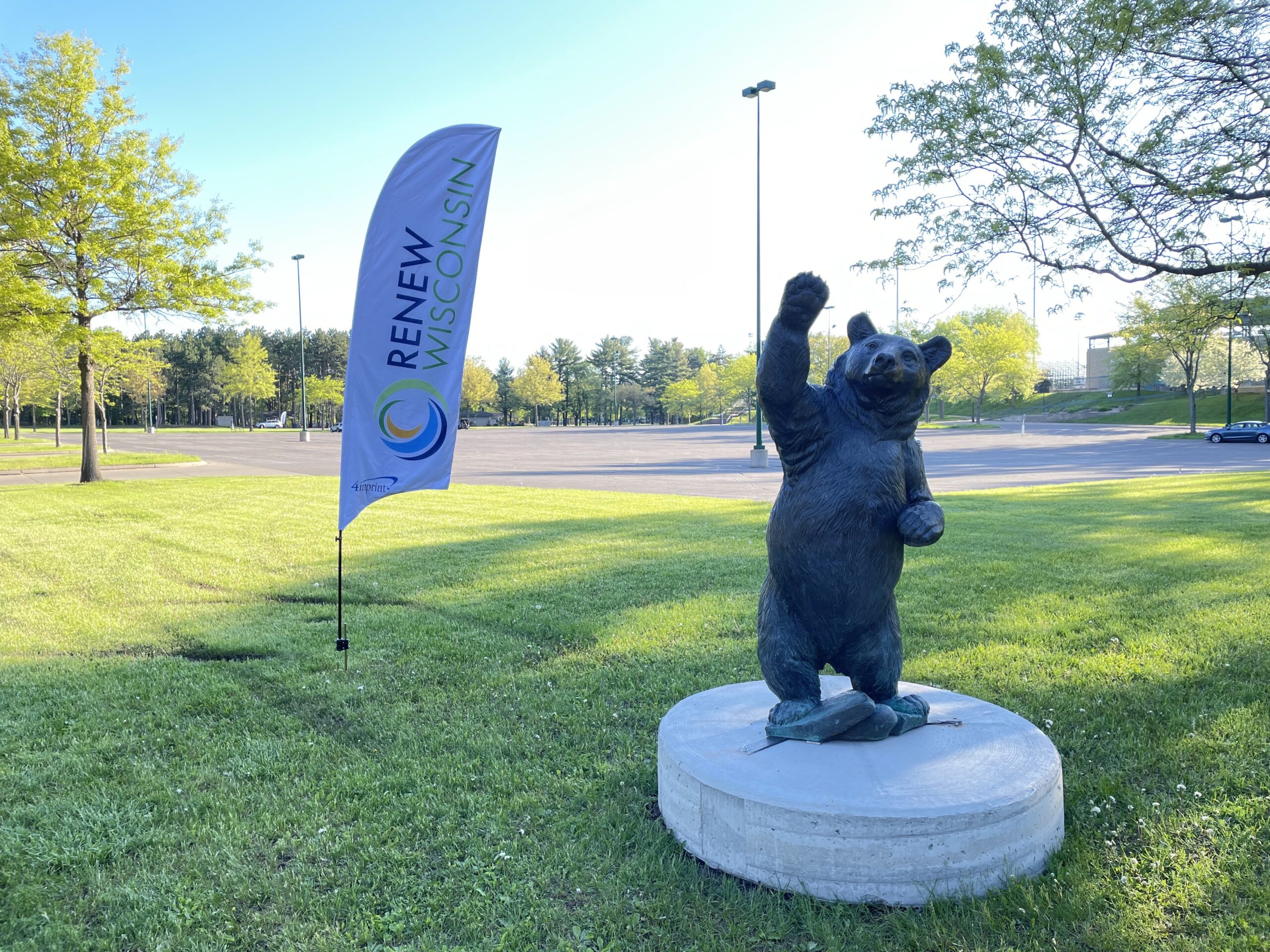
2022 RIDE WITH RENEW SPONSORS
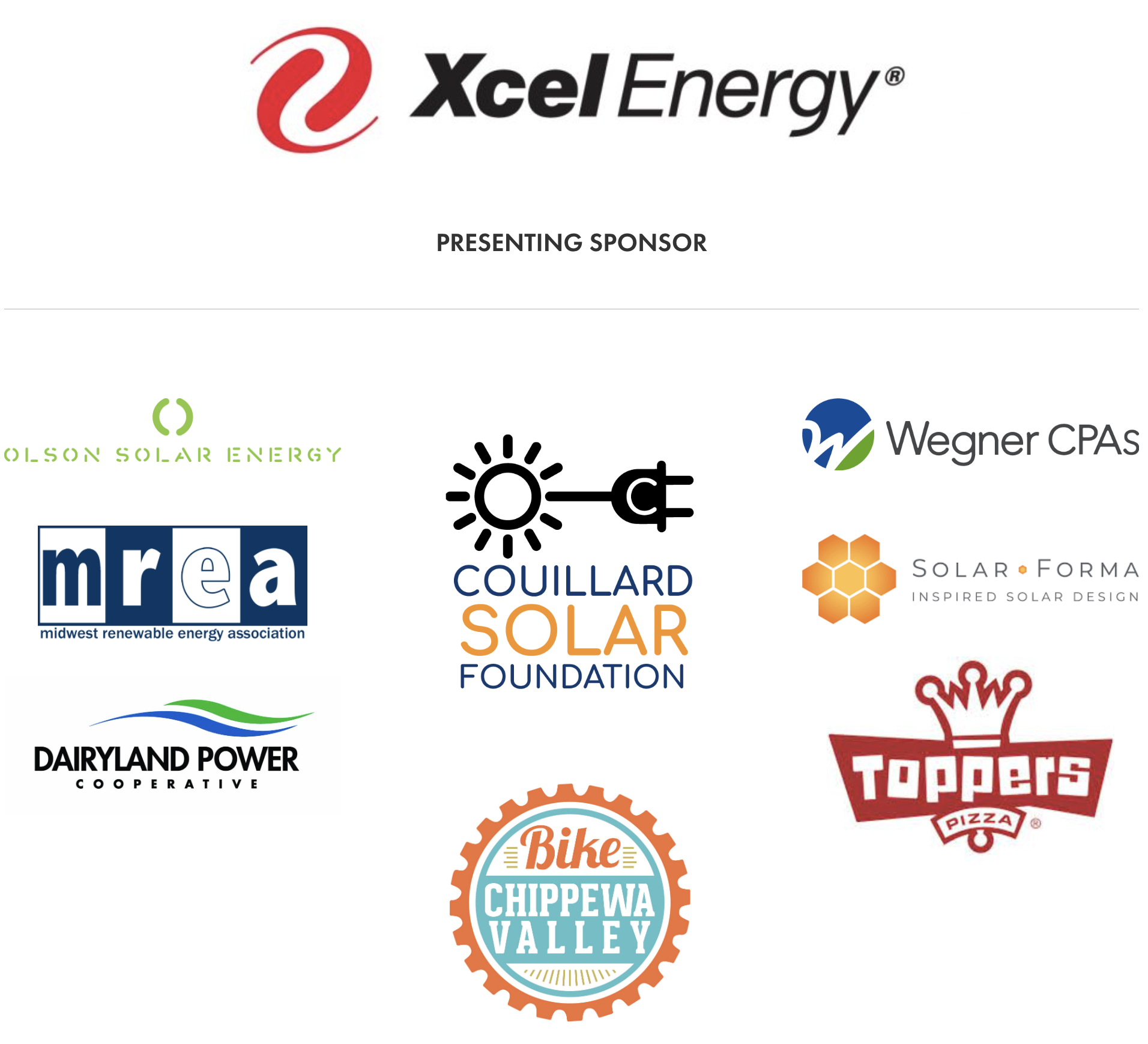
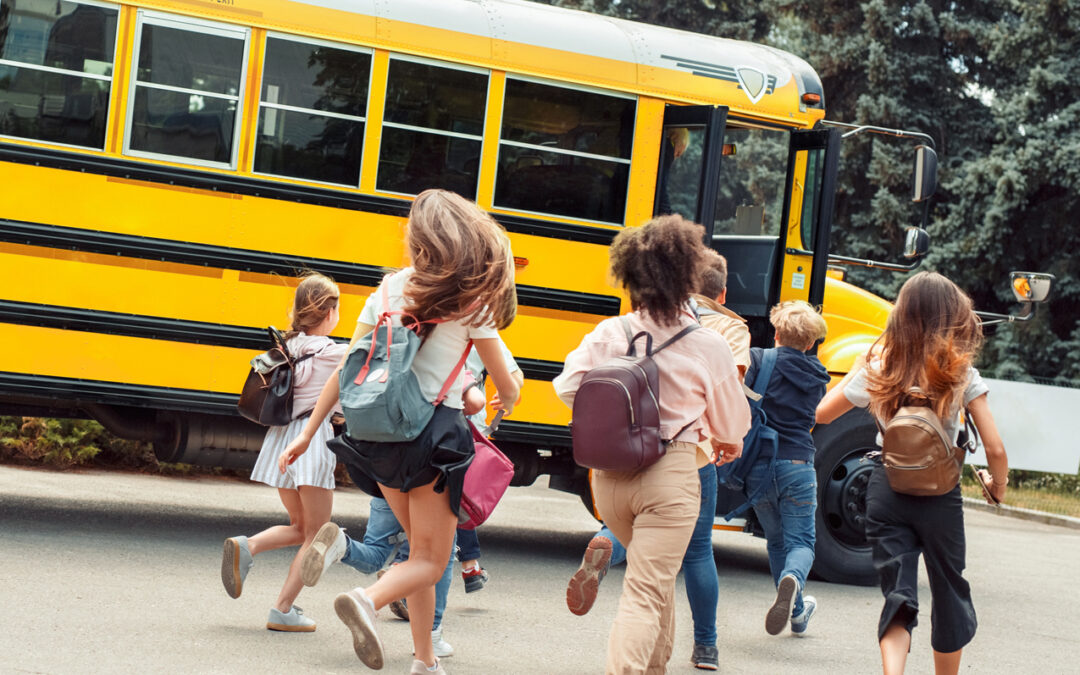
by Francisco Sayu | May 24, 2022 | Community, Electric Vehicles, Electrification, Local Government, Local Initiatives
The Infrastructure Investment and Jobs Act (IIJA), also known as the Bipartisan Infrastructure Law (BIL), was signed last November. It provides $5 billion to replace existing school buses with clean and zero-emission (ZE) school buses. This funding administered by the Environmental Protection Agency (EPA) can benefit school districts in Wisconsin by providing up to 100% of the cost of electric school buses, reducing transportation costs by 60%, and improving air quality throughout Wisconsin communities.
Why Clean School Buses?
School buses collectively travel over three billion miles each year, providing the safest transportation to and from school for more than 25 million American children every day. Exhaust from these buses harms human health, especially for children who have faster breathing rates than adults and whose lungs are not yet fully developed. The Clean School Bus Rebates (CSB Rebates) will fund the replacement of existing diesel and gas-powered buses with cleaner buses that result in better air quality, bus loading areas, and the community in general.
Cleaner buses such as those powered with electricity (electric buses) get the equivalent of 17 miles per gallon (MPG) compared to 6 MPG for diesel buses, providing average fuel and maintenance savings of $170,000 across the lifecycle of the bus. Wisconsin’s electric grid is increasingly powered by renewable energy sources like solar and wind. Transitioning away from diesel and gasoline to local – homegrown energy – will reduce air pollution and strengthen local economies.
2022 Clean School Bus Rebates Overview
The first $500 million of the Clean School Bus Program will be awarded as lottery rebates. The lottery will prioritize applications from low-income, rural, tribal, and/or high-needs school districts. Nearly 200 Wisconsin school districts are on the priority list. School Districts can receive up to $375,000 rebate per school bus (up to 25 buses per district) and $20,000 for EV chargers. The deadline to apply for this year’s rebate program is August 19, 2022.
Important Dates
| Activity |
Date |
| Online application. Submissions here |
May 20, August 19, 2022 |
| EPA reviews applications and begins the selection process |
September 2022 |
| EPA notifies applicants of selection and posts selectees online. Selectees can proceed with purchasing new buses and eligible infrastructure. |
October 2022 |
| Selectees submit Payment Request Forms with purchase orders |
October 2022 – April 2023 |
| Deadline to receive new buses, install EV chargers, replace old buses, and submit final documentation. |
October 2024 |
Eligible Applicants
The following entities are eligible to apply for EPA school bus rebates:
- State and local governmental entities provide bus services, such as public school districts, including charter schools, with an NCES District ID.
- Eligible contractors such as for-profit or nonprofit entities that can sell or finance clean or ZE school buses or related charging infrastructure to school bus owners.
- Nonprofit school transportation associations
- Indian tribes, tribal organizations, or tribally controlled schools are responsible for purchasing school buses or providing school bus service for a Bureau of Indian Affairs (BIA) funded school.
To be eligible for replacement, old school buses must:
- Have a Gross Vehicle Weight Rating (GVWR) of 10,001 lbs. or more
- Be operational at the time of application submission – Able to start, move in all directions, and have all operational parts
- Have provided bus service to a public school district for at least three days/week on average during the 2021/2022 school year at the time of applying, excluding COVID-related school closures
- If selected for replacement, a fleet can either:
- Scrap 2010 or older internal combustion engine buses; or
- Scrap, sell or donate 2011 or newer internal combustion engine buses.
Eligible replacement buses must meet the following criteria:
- Have a battery-electric, CNG, or propane drivetrain
- Be EPA certified vehicle model year 2021 or newer
- Have a Gross Vehicle Weight Rating (GVWR) of 10,001 lbs. or more
- Not be ordered before receiving official notification of selection for EPA funding
- Be purchased, not leased or leased-to-own
- Serve the school district listed on the application for at least five years from delivery.
For questions about eligibility, please contact cleanschoolbus@epa.gov.
Selection Process and Prioritization
The Clean School Bus Program prioritizes high-need school districts. Applicants that serve a prioritized school district will be offered more funding per bus and receive preference in the selection process.
Here is a list of prioritized school districts in Wisconsin.
Schools may also contact RENEW at info@renewwisconsin.org, for more information.
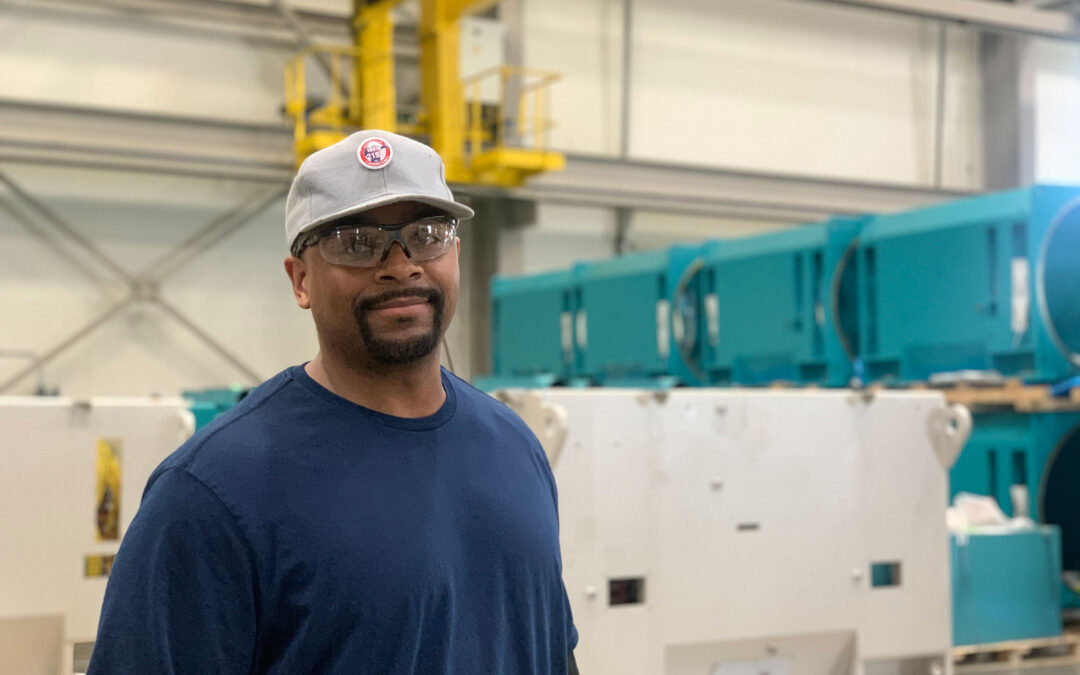
by Jodi Jean Amble | May 17, 2022 | Advocacy, Community, Electric Vehicles, Jobs, Local Initiatives, Renewables, Solar, Wind
RENEW Wisconsin has launched two state-wide communications campaigns to promote the benefits of clean energy investments in Wisconsin. The two campaigns, “Clean Energy Works for Wisconsin” and “Clean Energy is Made in Wisconsin,” include print and digital ads and shareable communications assets for partners and clean energy advocates.
Wisconsin’s clean energy workforce is 70,000 strong, with good-paying local jobs like installing solar and electric vehicle charging stations, manufacturing energy storage systems, servicing wind turbines, and retrofitting buildings. Clean energy job growth is gaining momentum from state and federal clean energy and electric transportation commitments, federal funds to support these goals, and an increased interest in clean energy investments from the public sector. The “Clean Energy Works for Wisconsin” campaign highlights the job potential of continued investment in electric transportation and Wisconsin clean energy.
“Over the next five years, Wisconsin can expect to receive $79 million in federal funds from the bipartisan infrastructure law,” said Francisco Sayu, Emerging Technologies Director at RENEW Wisconsin. “Wisconsin will also have the opportunity to apply for $2.5 billion in competitive grant funding dedicated to electric vehicle corridors and community charging. Building a network of electric vehicle charging stations will reduce emissions, improve air quality, and create thousands of good-paying jobs and is a tremendous opportunity for Wisconsin residents.”
In 2019, Governor Evers set a goal that all electricity consumed in the state will be 100% carbon-free by 2050, and in 2022 introduced Wisconsin’s first-ever Clean Energy Plan. Currently, renewable energy only accounts for 13% of all electricity sold in Wisconsin. According to the U.S. Energy Information Administration, Wisconsin consumes almost six times as much energy as it produces and spends billions on coal, oil, and natural gas every year. The “Clean Energy is Made in Wisconsin” campaign presents a vision of keeping more energy dollars in-state by investing in homegrown renewable energy.
“State and federal investments are moving us toward our clean energy goals, but we need to maximize the benefits of this energy transition for Wisconsin residents,” said Heather Allen, Executive Director at RENEW Wisconsin. “We will need an ‘all of the above’ and ‘all hands on deck’ approach to shape our clean energy future. This means smart investments in homegrown renewable energy and clean transportation.”
Print and digital ads are already circulating in media outlets across the state. To learn more and help amplify Wisconsin’s clean energy opportunities, please visit the “Clean Energy Works for Wisconsin” and “Clean Energy is Made in Wisconsin” landing pages.
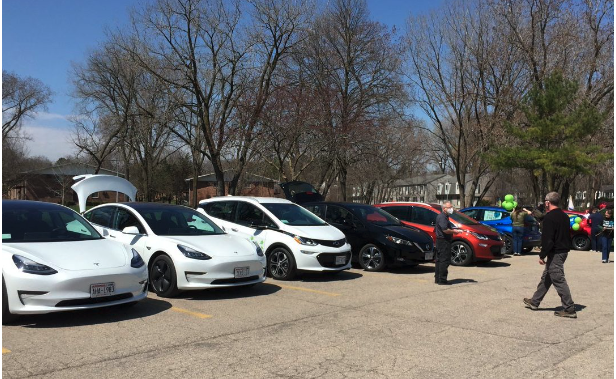
by Francisco Sayu | Apr 11, 2022 | Community, Electric Vehicles, Events, Local Initiatives
On Friday, April 22, 2022, Drive Electric Wisconsin, RENEW Wisconsin, Slipstream, Wisconsin Clean Cities and the Dane County Office of Energy and Climate Change will be hosting an Earth Day Electric Vehicle (EV) Parade in Madison.
A variety of electric vehicles will converge at Demetral Park at 1:00 pm. The parade will depart the park at 2 pm, drive through downtown, make two loops around Capitol Square, and return to Demetral Park. Spectators are encouraged to attend at Demetral Park, Capitol Square, or along the parade route.
All battery electric vehicles (BEVs), plug-in hybrid electric vehicles (PHEVs), electric trucks, and electric motorcycles are welcome to join the parade. For more information and registering for the event, please visit Earth Day EV Parade.
In the Wisconsin transportation sector, GHG emissions are the second-largest source of emissions; EVs currently present the most substantial potential to significantly reduce GHG emissions in the transportation sector, primarily when electricity is generated with low-carbon resources. EVs provide many benefits, including lower maintenance costs, lower fuel costs, zero local emissions, quieter operation, and faster acceleration. As Wisconsin continues to transition to clean energy, the environmental benefits of “driving electric” will continue to increase.
Local residents Carol and Andy Phelps organized Madison’s first Earth Day EV Parade in 2020 as a way to celebrate EVs and Earth Day amid the pandemic. In 2021, more than sixty vehicles joined, RENEW Wisconsin, Slipstream and Dane County Office of Energy and Climate Change for the second Earth Day EV Parade. Many EVs and electric motorcycles are expected at this year’s parade, including Ford, Volkswagen, GM, Tesla, Nissan, Hyundai, Kia, Toyota, Audi, Porsche, BMW, Mercedes-Benz, and Harley Davidson.



